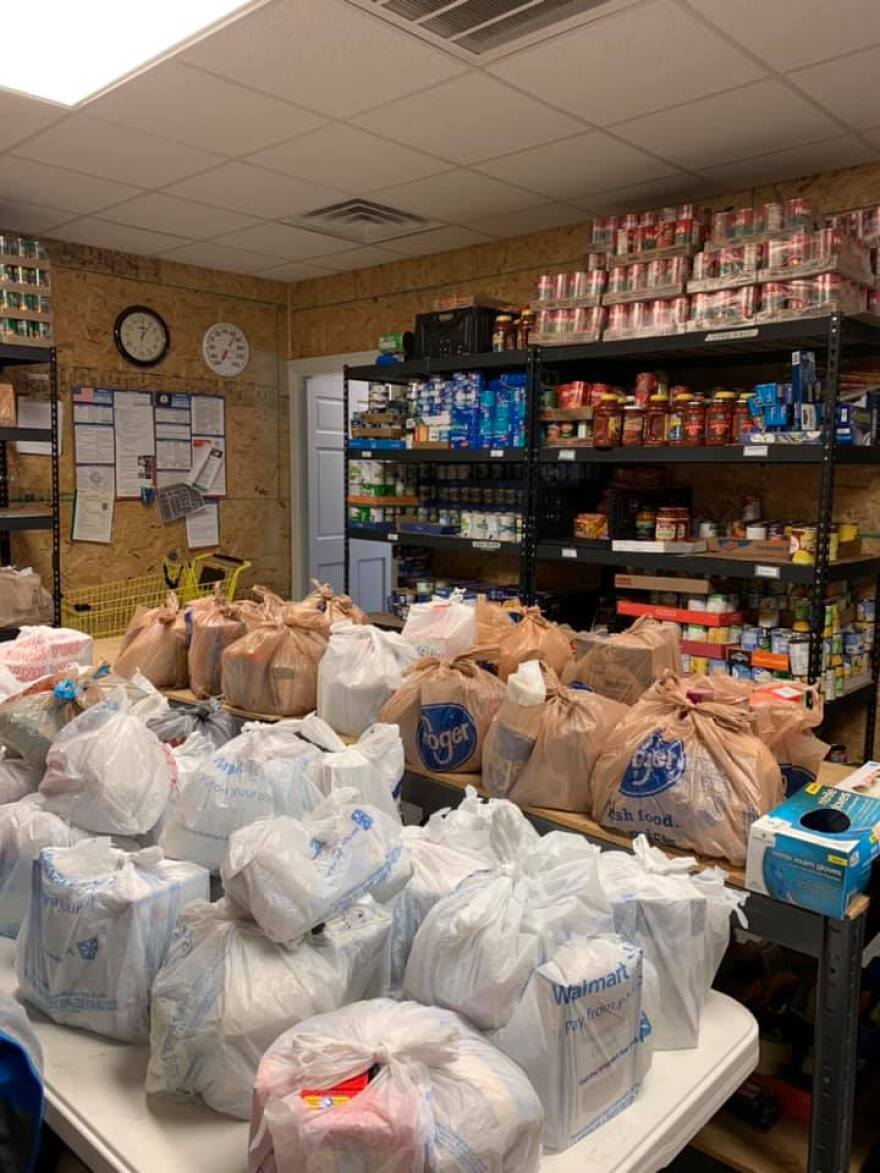This story is part of a WKMS News series highlighting organizations and groups helping others amid the pandemic.
Kidney beans, corn flakes, peanut butter, gallons of milk, and apples. Dozens of paper bags have been filled with food ahead of a recent Thursday morning at the Mission House in Hickman County, Kentucky, the sun shining in as a volunteer opens up the side sliding door of the warehouse.
Soon, cars begin to circle around to the side of the warehouse, passing by the front sign of the Mission House, where a Bible quote is displayed in smaller font, Matthew 25:35 — “For I was hungry and you gave me something to eat, I was thirsty and you gave me something to drink.”
There’s a warm familiarity as longtime volunteers take out the prepared sacks of food to the backseats and trunks of fellow community members, many they know well. One was a bus driver for the local school district, another a volunteer at the local museum. Knowing the community makes it personal.
“I was born and raised here, and I'm 65 years old,” Diane Eagan laughs. “So yeah, I should know everybody. But yeah, it does, it makes a difference.”
Eagan spent decades helping others as a nurse at Lourdes Hospital in Paducah, before finding time in retirement to help out at her local food pantry, which also has a front-facing thrift store offering clothes and furniture. There, Eagan helps gather discounted flower arrangements for those who may not be able to afford a florist.
When the threat of the pandemic first hit in March of 2020 there were worries about seniors who would normally come to food distributions, quarantined in their homes. Demand doubled to more than 200 people in their county of about 4,000, with cars circling around the block. But they persevered.

“The judge-exec come in and said, ‘Don’t close, you’re essential.’ So, we done what we had to do,” said Tina McAullife, the director of the Mission House. “I can look back now and wonder, ‘How did me and Diane do all of that for two months?’”
When restaurants, businesses, and schools closed that spring, numerous food pantries large and small stepped in as the first line of aid for many navigating a generation-defining crisis. When thousands of Kentuckians struggled to receive unemployment payments from the state, food pantries were able to meet the need for food with urgency. Food pantry directors say it’s a service they remain steadfast in providing in the months beyond the pandemic.
Providing Hope
Even with that help, food insecurity reached staggering levels in Kentucky, with 1 in 4 households in December reporting not having enough food to eat at times. In Paducah, the Family Service Society saw their demand triple that spring from the usual 200 families they serve.
Candace Melloy, executive director for the Family Service Society in Paducah, said her organization wasn’t sure if they would be able to meet the surge of demand in the beginning of the pandemic. Families weren’t sure when they could go back to work, if there would be work to go back to, or when their children would be able to go back to school.
At that moment of crisis, her pantry provided more than food, she said.
“You could see joy in their eyes and just a little bit of hope,” Melloy said. “Sometimes that's all that somebody needs to be able to fight for another day.”

And in recent months, Melloy and other food pantry leaders said demand at their pantries has dropped off in recent months. The latest survey data from the U.S. Census Bureau shows hunger levels nationwide have dropped to the lowest levels since the pandemic began. Melloy credits the second round of stimulus checks, more people collecting unemployment payments, expanded federal food aid programs including SNAP, and some beginning to find jobs as the economy slowly recovers.
But the pandemic has also shown how many families are one crisis away from falling into food insecurity and financial crisis, she said.
“We are the difference on if they can make it each month or not,” she said. “The pandemic, I think, just brought to light that everybody, how much easier it is to find yourself in that situation.”

Finding Food Through Faith
For some in western Kentucky, that crisis resource has come in the number of churches, home to food pantries.
In rural Ballard County, a small shed with a “general store” sign next to the Lovelaceville United Methodist Church greets those in need. The sign was a part of the church’s Bible school before the shed became home to pancake mix, mustard, green beans and tuna.
“One of the ladies who works here almost every week, she likes to do something a little bit special,” said Johnny Backus, who helps run the pantry. “She had like a fruit basket. She had little candy bars in the bottom, then apples and bananas and oranges and stuff like that. It was really nice.”

On the front desk of the pantry is a sign-in sheet, where families receiving let those at the pantry know how many are in their household, and if there’s anything else on their mind. Some who receive food ask for prayers for sick family members, or advice for those struggling with mental health.
Backus said he doesn’t pass any judgement for those who come to the pantry because of the stigma some give to those who go to food pantries. He doesn’t know what their circumstances are, and he doesn’t think twice about providing the help they need. He finds inspiration for his volunteer work in his faith.
“When you see people coming in that have a need, and you're able to feel that need. And it just is what Jesus taught us to do,” Backus said. “And you feel like you're doing a little bit of what we're supposed to be doing. It might not be doing a lot, but it’s at least a little.”
He said his pantry helps about a dozen families a month, but to him, that’s a dozen families that he and others have made a difference in their lives.

For 74-year-old Martha Holbrook back at the Mission House in Hickman County, relying on the strength her faith provides for her on a daily basis. The sacks of food she receives is just another part of that blessing.
“I’m so grateful to get food like this here when you can't afford to go to the grocery store,” Holbrook said behind her two masks. “A lot of people like me, I don't go to the grocery store too often. With the pandemic, if you got health issues, you really have to watch who you're around.”
Holbrook hopes for an eventual end to the pandemic, with vaccinations on the way. But for now, she has food in her car.
“I appreciate everything they do. They say God is good all the time, and all the time, God is good.”





